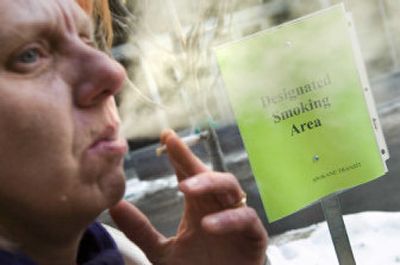Cold reality faces smokers at 25 feet

At 8:30 p.m. Thursday, the Mayfair was empty and bartender Mark Roberton was contemplating an early close.
“If I’m not paying the power bill and they’re not coming, what’s the point of staying open?” Roberton asked.
Smoke was noticeably absent Thursday at bars across downtown Spokane as Washington’s new toughest-in-the-nation smoking ban went into affect. In many cases, bartenders reported that customers were noticeably absent, too – though some wondered if the decline came because so many people came out Wednesday night in a farewell to smoking.The law, which was passed overwhelmingly by voters in November, amends the state’s Clean Indoor Air Act that was passed in 1985 to include places that were exempt from the original ban. Starting Thursday, restaurants, bars, taverns, bowling alleys, skating rinks and card rooms could no longer allow patrons to light up.
What makes the law so tough compared to other smoking bans is that it also outlaws smoking within 25 feet of the doorways, windows and air intakes of public places.
And that’s what was irking a dozen or so folks waiting for buses downtown at the STA Plaza Thursday night.
The areas in front of the bus stops were mostly empty about 7 p.m. Most of the riders were waiting on a small curb space designated for smokers.
Enrique Acedo noted that the smoking area wouldn’t even be protected if it were raining.
“As long as you aren’t blocking people’s way or blowing it into people’s faces, you should be able to smoke where you want to,” Acedo said.
The Spokane Regional Health District, the agency charged with enforcing the ban, received about two dozen smoking complaints Thursday, said Maggie Merrill, tobacco prevention and control program coordinator. She said the district will focus on informing businesses before it begins handing out fines.
Although the district is responsible for enforcing the business portion of the law, police enforce individual violations, like someone smoking within 25 feet of the door of a business.
But don’t expect police to be measuring smoking distances anytime soon.
“We prioritize our workload,” said Spokane Valley Police Chief Cal Walker. “I can’t imagine that there are times smoking violations are going to be a higher priority.”
However, he said, police may work with the health district to allow it to hand out smoking tickets, much like some store security guards have authority to write tickets for shoplifting.
Merrill said that if Washington is like other places that have passed smoking bans, upset smoking customers will come back to bars after a few weeks. They’ll get used to limits and new nonsmoking customers will emerge.
“After a few weeks, things tend to normalize,” said health district spokeswoman Julie Graham.
Another benefit, Merrill said, is it will help people quit, and like other areas with smoking bans, the state likely will experience a decline in smokers.
About 22 percent of adults in Spokane County smoke, a rate 2 percent higher than the state as a whole, Merrill said. A 2004 school survey showed that 15 percent of local 10th-graders smoked.
The Mayfair would normally have 15 or so people in it on a Thursday evening, said bartender Roberton. But the clientele, many of whom are military veterans, simply stayed home, he said.
“These people served our country and now they’re being told that they can’t go to their local bar?” Roberton said. “What’s going to happen to the small places?”
Next door, at Judi’s Place, a handful of customers sat along the bar, about half as many as usual, reported bartender Amber Hinsdale.
“The guys that get off work at 5 or 6 o’clock, I really haven’t seen them,” she said.